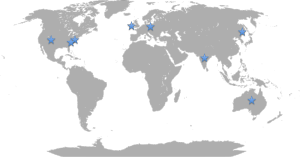Global project teams happen more often than not these days making it no longer feasible to get everyone in a room to facilitate a project. As a Project Manager & leader for both global team members and global customer teams, I’ve experienced the added complexity of this on my projects.
A LiquidPlanner blog post by Tim Clark from October 2013 “7 Tips for Managing a Global Project Teams” highlights time zones, cultural, religious, and sociological differences. Mr. Clark also recommends staying on top of advances in software solutions to simplify the process.
Inc. published “5 Tips to Manage a Team Across Multiple Time Zones” by Will Yakowicz in July 2014, which also had very applicable information. Mr. Yakowicz reminded us that we can’t work 24 hours/7 days a week, emphasizing a consistent schedule. He also encouraged us to leverage the latest technology, invest in airfare to facilitate team cohesion while also recognizing that we must be extra aware of those people who aren’t sitting in the same room as us.
In my experience, there are a few additional key considerations for successfully managing global teams.
- Be Flexible – As the project manager, it was my responsible to facilitate the project. Some things do just get lost in translation over email, and it’s necessary to have a phone or video session. Unfortunately, it’s not all about me, therefore it can’t be all about my time zone. I often had calls in the early morning or late night to coordinate with Europe (EMEA) or Asia (APAC) as required.
- Be Available – When you have remote teams, it is imperative for each team member to be more communicative than would be required if everyone was in the same place. I can’t hover at someone’s cubicle when they are based in Ireland, but I can make myself as available as possible, as well as encourage each of my team members to do the same, on any mediums used by the respective regions.
- Diligently Break Down Barriers – Communication is hard. It’s even harder when you’ve never met a person, other than via email or phone. More often than not, when you are driven to a phone call it’s to resolve an issue. I encourage you to take the time to introduce yourself and chat. By learning the personality traits, and what drives your team, you will be better able to motivate them.
Managing global teams is difficult. The pace of project delivery, technological advances and life adds to the complexity. However, it is the new normal. We’ll need to step up our game to learn to do it well.
